| |
"It's not a Sam Peckinpah film. I haven't seen it, otherwise I think I might do violence to those concerned." |
| |
Sam Peckinpah on the studio recut of Convoy |
That our taste in film changes with time is somewhat inevitable, reshaped as it is by a combination of new life experience and exposure to a greater number and (hopefully) wider range of movies. A film that once seemed so original, for example, looks a lot less so when we retrospectively catch up with the twelve or so takes on the very same story that preceded it. Then there are the movies we enjoyed so much in our youth, those we recall fondly in adulthood but revisit apprehensively for fear they that may not measure up to the rose-tinted memories we have of them. Sometimes this delivers pleasant surprises – I couldn't believe how good a select few of the martial arts films I grew up on still look – but occasionally leaves us wondering just what we were thinking in our younger days.
A case in point for this particular viewer is the 1978 action-drama Convoy, the penultimate film from the great Sam Peckinpah. Back on its original release, my friends and I flocked to see it, all being enthusiasts for the work of its singular director. And if you come to it for the first time and can't for the life of you work out what made it a box office hit and subsequently landed it a small but enthusiastic cult following, then let me assure you it seemed neat at the time. No, really. Allow me to explain.
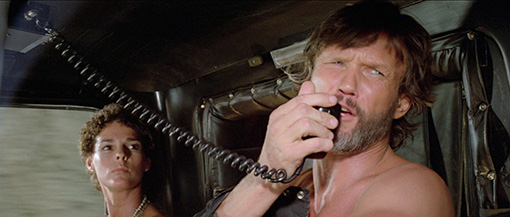
It's important to remember that way back then there were no mobile phones, and unlike all those American movie teens, no-one I knew had a phone in their bedroom. There was only one telephone in the average house and that belonged to your parents, and you didn't get to use it whenever you wanted. Citizens Band radio, or CB as it was known, was an exciting concept to us in our youth, a device that allowed its owner to talk to people they'd never met, whenever they wanted, and in a language that everyday folk didn't understand. Best of all, it could be operated from the inside of a moving vehicle. Oh wow. Sure, it was a largely US phenomenon, but we were young and in the thrall of all things American, and the idea of being out on the road, driving a huge Mack truck and exchanging coded greetings with our fellow travellers seemed, for just a short while, to be just about the coolest thing in the world.
Then in 1975 this widespread fascination with big trucks and CB radio gave birth to a song, Convoy by C.W. McCall (whose real name was Bill Fries, but if you'd recorded this then you'd probably use a pseudonym too). It's the sort of thing that nowadays gets classified as a "novelty song" (that's certainly what it's labelled on Wikipedia), a bit like Chuck Berry's My Ding-a-Ling or Benny Hill's Ernie The Fastest Milkman in the West, scurrilous company at best. Back in 1975 it was a serious hit in its native land, topping the American pop and country charts and staying at number 1 in the latter for five weeks. It also got to number 2 in the UK, its success prompting two witless Radio DJs – Paul Burnett and the not-so-popular-since-he-got-himself-arrested Dave Lee Travis – to recorded a would-be parody titled Convoy GB, a song so utterly wretched that it really should be added to Mr. Travis's current charge sheet.
Feeding hungrily off this cross-continent love affair with big motors, CB radio and good ol' boys was Hal Needham's 1977 action comedy Smokey and the Bandit, in which cheerful and cheeky truck driver Bo "Bandit" Darville (played by Burt Reynolds at the height of his popularity) goes up against a Texas Sheriff named Buford T. Justice (the actual name of a real Florida Highway Patrolman, believe it or not). The film was one of the biggest box-office hits of the year. How, studio execs wondered in their uniquely unimaginative way, can we cash in on that? Well, how about a film along the same lines as Smokey and the Bandit but based on that song by C.W. McCall, one where rebellious truckers go up against a vindictive sheriff, who then makes it his personal mission to bring them to book?
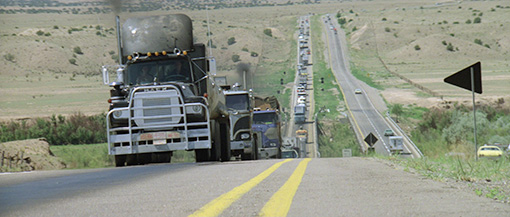
Even at the time, the lyrics of a four-minute novelty song did not strike me as a solid basis for 106-minute feature film, but that clearly didn't deter screenwriter Bill Norton (or B.W.L. Norton as he's credited here), who took his script to Hollywood and quickly landed a film deal. There's a rather discomforting lesson in there somewhere. Norton even had a clear idea of who he wanted to direct it, none other than the aforementioned Sam Peckinpah, whose work he greatly admired. But why would a director of Peckinpah's considerable standing want to make a truck movie that based on a novelty song? It's a question that bugged me for a number of years, and when I did get the answer it wasn't one I necessarily wanted to hear. By this point in his career Peckinpah was apparently almost unemployable, his projects having repeatedly overrun their schedule and often their budgets, while the director himself had moved on from hard liquor to cocaine as his recreational chemical of choice. But he loved making films, and thus jumped at the offer to direct a new movie, whatever it may be.
Even by Peckinpah's late career standards, this was not a smooth shoot. He and executive producer Michael Deeley (whose impressive CV includes The Italian Job, The Man Who Fell to Earth, The Deer Hunter and Blade Runner) were at loggerheads from an early stage, his cocaine use sometimes saw him refuse to leave in his trailer, and a few sequences were even passed over to his friend and previous collaborator James Coburn to direct.* At one point Deeley tried to have Peckinpah fired, a move that was blocked by leading man Kris Kristofferson, who also threatened to walk if his friend was given the boot. When the film finally wrapped, eleven days behind schedule and at twice its original budget, Deeley took the film out of Peckinpah's hands, discarded his first cut and brought his own man in to re-edit it from scratch. Astonishingly, the result proved to be the most commercially successful film of Peckinpah's career. Say, what? Yep, forget The Wild Bunch, forget Straw Dogs, Convoy was the film that proved Sam Peckinpah could deliver a sure-fire hit. And you know what? When we went to see it back in 1978 we thoroughly enjoyed it. There was little in the way plot, sure, but the trucks looked good, they barrelled through anything that got in their way, the action was peppered with the director's trademark slow motion, and this band of free-spirited outlaws got to stick it to the man.
Approaching the film for the first time in a good many years, I wasn't expecting to be blown away – as I said, tastes change with time – but I did hope to recapture just a little of the pleasure of that innocent first viewing. And therein lies the problem. Before I go on I should reiterate a point that I frequently make on this site and assure you that the issues I have with Convoy are mine and mine alone – I like to think I'm not one of those self-opinionated arses who claim that if they don't like a film then the film is at fault. Convoy was a popular movie in its day and it still has an enthusiastic following, and some of you reading this will watch it and quite possibly enjoy it every bit as much as I did back in the day. And it's not that I hated it, not by any means, and I even found a few small things to enjoy that I'm sure passed me by the first time around. But in other respects time really has dealt my amiable relationship with this particular film a sharp kick in the nuts.
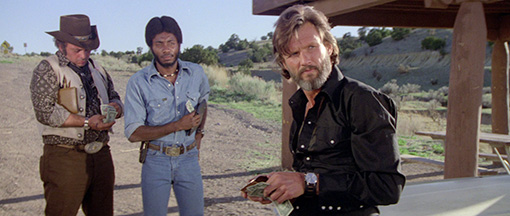
So where do I start? Well how about the plot. OK, no-one's going to expect a story based on a song of any sort to be full of twists and turns, but I genuinely don't remember it being quite as thin as this. Truck drivers Rubber Duck, Love Machine (or Pig Pen as he's known to his fellow drivers) and Spider Mike have a run-in with corrupt and vindictive Sheriff "Dirty Lyle" Wallace when he stops them for speeding and extorts a bribe from each of them. A short while later Wallace turns up at the truck stop where the boys are hanging out, and a confrontation between Wallace and Spider Mike triggers a punch-up and ends with the Sheriff knocked out and left handcuffed to a bar stool. Accompanied by Melissa, a girl Duck briefly encountered on the road earlier, the truckers head off across Arizona and New Mexico pursued by a determined and angry Wallace. In the course of their journey they are joined by other truckers to form a convoy as an act of protest against Wallace and his corruption.
Save for the fine detail, that's about it. Potentially intriguing complications involving a racially motivated police beating dished out to Spider Mike and a New Mexico Governor looking to make political capital from the truckers' cause are thrown in to the mix but never really developed. For the most part it's all about the feud between Duck and Wallace and the spectacle of big trucks driving along the highway and smashing through cars and buildings. And try though I might, this time around I couldn't get excited about any of it. I guess I've reached an age where even the biggest and shiniest truck in the world is no more to me than a vehicle for transporting goods. It's the same with all that CB chatter, a coded variation on English that once had me intrigued but now sounds a little daft, like a middle aged white man trying to rap.
There's potential in a cast that includes a number of previous Peckinpah alumni, but the anaemic script gives them little to work with, and the shadow cast by Smokey and the Bandit is keenly felt here. Kristofferson's stoic growl is never as much fun as the cheerful energy that Burt Reynolds radiates in Hal Needham's film, and even Ernest Borgnine's enjoyably grouchy turn as Dirty Lyle Wallace feels like a partial knock-off of Jackie Gleason's role as Smokey's Buford T. Justice. And then there's Ali McGraw. OK, I've never been exactly her biggest fan, and for me she was the weak link in Peckinpah's otherwise superb The Getaway (well, her and Quincy Jones' annoying music score, but that's the subject for another review). But here she almost sleepwalks through the role as Melissa, while her oddly mannered delivery makes her sound a little like she was post-dubbed by Julie Andrews trying to feign an American accent. It comes almost as as a relief to hear that McGraw herself looks back at the film as one of the low points of her working life and remains extremely unhappy with her own performance in it.
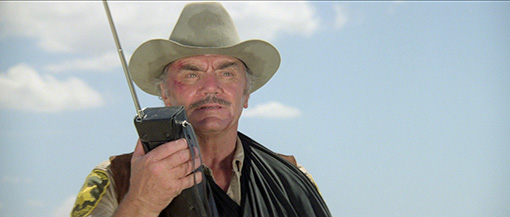
Perhaps most disappointing of all for Peckinpah aficionados is that the use of slow motion, though elegant in itself, is never as seamlessly integrated into the action as it is in the director's previous films, an almost inevitable consequence of excluding Peckinpah from the editing room. And it's probably just me, but slow-motion shots of truckers being hurled onto tables and through glass display cases (some good stunt work here regardless), or big trucks ploughing through balsa wood houses, have none of the satanic beauty of the balletic bloodbaths for which the director became famous.
Not everything has lost its edge with age: Harry Stradling Jnr's scope cinematography gleams in the sunlight; the day/time captions that appear in time with their announcement in the song lyrics are as snappily effective as I remember; Peckinpah still had a knack for smart camera placement; and a lively supporting cast that includes Burt Young, Madge Sinclair and Franklyn Ajaye ensure the truckers themselves are a likeable if largely insubstantial bunch. But the paper-thin story and lack of substance and interesting action left this former fan genuinely surprised at how unsatisfied the film left him feeling. Time, methinks, to give Sam's oft-maligned final feature The Osterman Weekend another look.
The early signs are not that good, with a fuzzy United Artists logo followed by a title sequence in which shots of desert sand are gritty with film grain and dancing with moire. But once we clear the credits (which were photochemically bonded to the film back then, a process that could sometimes degrade the original image a little), there's a pronounced jump in quality. Though there is some variance here and there, for the most part this is a sparkling transfer, boasting a finely balanced contrast range, a lively colour palette that never feels over-saturated, and a lovely crispness and level of detail. If you're still a fan of the film you're going to be well happy with this.
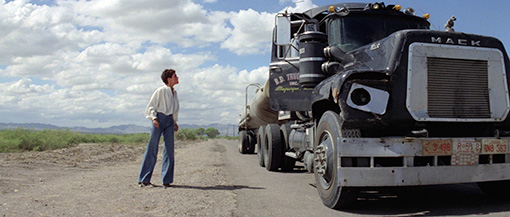
The DTS Master-HD 2.0 mono soundtrack is clear, clean and boasts a decent dynamic range for a non-5.1 mix. If you fancy a bit of fun, try watching the film with the included French or German dubs, which are also DTS-HD Master Audio 2.0.
French, German and English SDH subtitles are also included.
All of the extra features here have apparently (I'm working on second-hand information here) been ported over from a previous American DVD release, which is no bad thing given their quality and relevance to the main feature. I'm guessing, however, that the transfer on that disc was letterboxed rather than anamorphic and that the extras were likewise framed, which puts the widescreen image in a 4:3 frame, which then sits in the centre of the Blu-ray's 16:9 frame, placing a whacking great black border on all sides of the picture. Feel free to zoom in and fuzz up the image if your TV is capable.
Many of the extras are the work of Mike Seigel, whose ongoing Passion & Poetry project also delivered the fine Sam Peckinpah's War documentary on Optimum's Blu-ray of Cross of Iron, the German 2-disc DVD Passion & Poetry – The Ballad of Sam Peckinpah, and the book Passion & Poetry – Sam Peckinpah in Pictures.
Passion & Poetry: Sam's Trucker Movie (70:02)
I always get excited when a retrospective making-of documentary runs for over an hour, because I then know I'm going to get a good deal more than the superficial back-slapping and sound bites that make up the average EPK featurette. Documentaries of this length generally follow the film from conception to release and beyond, as seen through the eyes of some of those involved in its production. The best of them are also up front about things that did not go so well, and Sam's Trucker Movie is certainly that, a refreshingly candid look back at a troubled production, with contributions from actors Kris Kristofferson, Ali McGraw and Ernest Borgnine, executive producer Michael Deeley, Peckinpah associate Katy Haber, and Peckinpah biographer Garner Simmons, with audio input from Peckinpah himself. There's also an odd little segment on German fans of the film and 'Rubber Duck' truck owner Gerd Albrecht, and a brief contribution from James Coburn towards the end. The interviews here are enthralling for their recollections and their unabashed honesty, with Ali McGraw in particular impressively open about her troubled time on the film (which she at one point dismissively describes as "terrible") and how it negatively affected her performance. A fine extra feature.
There are three brief but interesting Featurettes: Promoting Convoy (5:21) is a well assembled rolling gallery of poster artwork and promotional stills from around the world, set to twangy music and that damned song; Three Lost Scenes (5:33) combines captions, scans of the original screenplay and production stills to recreate three missing scenes; In-Jokes, Friends and Cameos (5:44) usefully highlights numerous examples of each of these categories – we all knew it was Sam on the camera car, but a good few of the others were new to me.
More Production Stills (3:05) is a rolling gallery (to music) of production stills animated with the Ken Burns effect.
In Trucker Notes From Norway (3:04), Norwegian Convoy fan Anders Løfaldi outlines why the film is a bit of a favourite with fans of Mack trucks, though the combination of his uneasy English, stare-ahead presentation and detailed knowledge of the Rubber Duck vehicle does paint him as a bit of a truck nerd.** Knows his stuff, though.
Four Radio Spots (2:58) play over stills and poster art. The first is the funniest.
The US TV Spot (0:59) has the same comical voice-over that graces the first TV Spot above.
The only HD extra here, the inevitable Trailer (3:38) comes close to telling the whole story in three-and-a-half minutes.
I so wanted to come back to Convoy and feel it was every bit as good as I once remembered, but it just didn't happen. It will for some, perhaps even many, and certainly if you have the sort of thing for big American trucks that I had briefly in my youth then you'll probably get a lot more out of it than I did this time around. The transfer looks great, though, and despite being standard definition and sitting in an island in the middle of the HD screen, the extra features – particularly the documentary – are of a very high quality. The disc itself thus has to come recommended, but personally if you're looking for a cinematically exciting convoy I'd suggest taking another look at the climax of George Miller's excellent Mad Max 2.
* At this point in his career, Coburn was looking to move from acting into direction and came on board as the film's second unit director.
** As it happens, Anders Løfaldi wrote to me to assure me that he's not a truck nerd at all, just a serious enthusiast for all things to do with the film Convoy. I stand corrected.
|